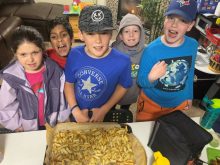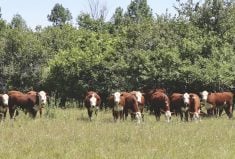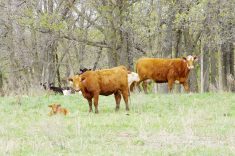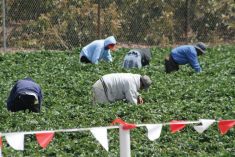“Words without action are meaningless.”
Teacher Steven Schultz couldn’t have predicted the effect those words would have when he said them in class one day 15 years ago.
But at least one student took them to heart: She decided she wanted to take École Lacombe Composite High School off the electrical grid.
She gathered a group of 12 students, developed a proposal, and started fundraising. Two and a half years later, the group had raised enough money to put a six-kilowatt solar power system on the roof of the school.
Read Also

Farming Smarter receives financial boost from Alberta government for potato research
Farming Smarter near Lethbridge got a boost to its research equipment, thanks to the Alberta government’s increase in funding for research associations.
In September 2009, they flipped the switch. And just like that, the school’s Ecovision Club was born.
“Ecovision has as its mandate to grow student leaders through project-based learning,” said Schultz, the faculty adviser for the club.
“Leadership is one of the highest values of the program. We want students to become leaders. They’re the ones who implement projects, dream about them, research them, contact community volunteers to help with them.
“How else can you become a good leader unless you dip your toes in and try it for yourself?”
The club, which has about 20 student members who meet weekly, operates under three guiding principles — collaborating with the community, enhancing the environment, and enhancing students’ education. And the students have taken those pillars to heart, growing the club from that first solar panel on the school’s roof to a thriving microbusiness.
And that hard work has paid off: in 2018, École Lacombe Composite High School was named one of the Greenest Schools in Canada by the Canada Coalition for Green Schools.
But the journey wasn’t without its setbacks. Shortly after they flipped the switch on the solar power system, there was a fire on the roof of the school that destroyed the project.
“The whole school got evacuated, and while other students were screaming and cheering, I had my group of students huddled around me in tears because their project was up in flames,” said Schultz. “It cemented the whole idea that these students really were passionate about the environment.”
Growing a microbusiness
Undaunted, the club’s students came up with a new motto — “Out of the ashes, we will rise” — and decided they were going to build a greenhouse.
“But it wasn’t going to be just any typical greenhouse,” said Schultz. “We wanted to have an energy-efficient greenhouse with renewable energy sources, and have it be a tropical greenhouse at the same time.”
After two years of research, they came up with a design that would make the greenhouse nearly net zero, with the right kind of climate for growing tropical plants. The greenhouse was finally built in 2012, and today, the students grow bananas, lemon trees, avocados, pineapples, and more. There’s even a full-fledged aquaponics system that houses tropical fish.
Once the greenhouse was up, though, another opportunity stared them right in the face: The land around the greenhouse would be perfect for a little more conventional food production. So they built a community garden, too.
Now, the land is home to a two-acre garden with 175 fruit trees, 50 raised beds, potatoes, garlic, squash, and other locally grown plants, all maintained using permaculture principles to make them more sustainable and productive.
But then they were faced with a new problem: What to do with all the food they produced?
Their yields were far more than the school’s food preparation program could use. So the students started pursuing local businesses that might need fresh, local produce, and with a little help from a professor from Burman University (an independent university in Lacombe), who taught them business principles, the students turned their club into a microbusiness.
“Everything is run by the students. If they decide that they’re not being successful, they make the decision and we move on to something else,” said Schultz.
“We now have eight different businesses in town that buy our produce, and our honey as well, and we give a portion of our produce to the food bank every year.”
The club is run like a “true business,” he added.
“A percentage of the earnings goes to the students, a percentage goes to pay off expenses, and a percentage goes back into the club. It’s real life. I don’t sugar-coat it. If we flop, I let the students know we flopped.”
Soft and hard skills
And just like any other business, this one has had to diversify based on market demands.
“Right now, we’ve discovered a little niche in the market for beeswax wraps, which can replace Saran Wrap,” said Schultz. “So we’ve been in full production mode and have made 50 or 60 of the wraps, and they’ve already been pre-sold. We already have an order for another 100 wraps, so it’s really taken off.”
Aside from learning about food production and business management, the students are also learning how to communicate, collaborate, and solve problems, all in a hands-on environment. These types of soft skills will become increasingly important as the students graduate and move on to post-secondary and the working world.
Schultz hopes some will be bringing those skills to Alberta’s agriculture industry.
“Agriculture is the second-largest contributor to our economy but it’s not consistently taught in our schools,” he said.
“In the next five years in Alberta alone, there is going to be a labour shortage in the thousands in the agriculture industry. Agriculture is a big part of our economy, a big part of our community, and a big part of our culture.
“We should be exposing our kids to it as much as we can.”
As part of the Ecovision Club, students are learning the ins and outs of greenhouse production and beekeeping, and Schultz is hoping to add small livestock to the list in the near future, with a new project they’re launching soon — a goat sanctuary the students are calling Roofs for Kids.
“We’re repurposing sea containers to house the goats — preventing these sea containers from being put into the dump or sitting out somewhere rusting,” Schultz said of the project, which will have a living roof and other environmentally friendly features.
“It’s a very efficient way of putting a building together, but we want our Roofs for Kids to be a modular structure so that anybody in the province could implement our design and install it anywhere.”
Investing in students
But Schultz worries that changing provincial budget priorities will hurt these types of programs in small-town schools. While the Ecovision Club is self-sustaining thanks to fundraising and the profits from the microbusiness, innovative programs are usually the first thing on the chopping block during budget cuts.
“People look at them as surplus, when in reality, it’s these programs that keep students in school and prepare them for the future,” said Schultz.
“You can have an Einstein of a student when it comes to science and math, but if they don’t know how to apply the science and the math to real-world problems, they’re just a smart person without a job.”
These types of programs build those skills in students, and as far as Schultz is concerned, that’s an investment in the future.
“Students are the most underutilized resource in our society. I really believe that,” he said.
“Their dreams, their vision, are a very important part of our future. So as long as students are still willing to step out of their comfort zones and dream, I’ll continue to build projects with them.”
For more information, visit lchsecovision.weebly.com.















